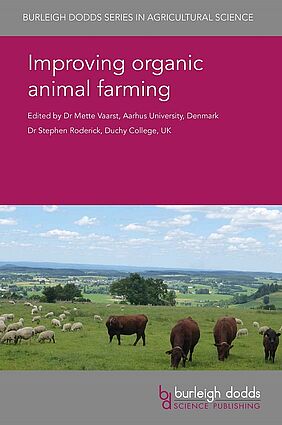The book "Improving organic animal farming" reviews key challenges and solutions to improve the health and welfare of organic farm animals. It includes case studies on improving organic farming of dairy and beef cattle, sheep and goats, pigs and poultry. Additionally, it addresses how organic livestock farming can build on smallholder systems such as pastoralism and agroforestry.
Contributions from FiBL authors are:
- In Chapter 11, Florian Leiber and colleagues Adrian Müller, Veronika Maurer, Christian Schader and Anna Bieber address sustainability issues from a dairy farming perspective. They propose innovative solutions and strategies to improve the resilience of organic milk-producing systems typically found in the temperate regions of Europe and in the United States, where sustainability is threatened by an overreliance on non-renewable resources, and especially fossil fuels. These strategies aim to enable organic farmers to satisfy the aspiration to feed dairy animals a natural diet, whilst also dealing with the potential conflicts that inevitably occur when complex farming systems have multiple objectives.
- In Chapter 14, Barbara Früh and Mirjam Holinger explore some of the feeding, housing, breeding and husbandry issues in relation to the opportunities for improved organic pig production, as well as tackling the ethical issues associated with practices such as castration.
- In Chapter 15, Veronika Maurer and Scandinavian colleagues elaborate on opportunities and challenges of organic poultry production. Poultry fit into many different systems for the mutual benefit of animals, the farming systems and the humans involved. At a global level, they contribute to food security, protein supply and the livelihood of numerous families in smallholder settings and they fit into urban and peri-urban farming systems as well. In Europe, most organic poultry are kept in comparatively large systems, which leads to decreased breed diversity, a complete separation of egg and poultry meat production as well as a growing detachment between animals, feed, land and consumer. These challenges are discussed and potential solutions are presented.
- In Chapter 16, Timo Stadtlander introduces the concept of organic aquaculture and unravels some of the economic, ecological and ethical issues that have arisen during the development of this sector, which in turn help us understand the challenges faced by organic fish farmers, policy makers and consumers.
Further information
Contact
Mirjam Holinger, FiBL Switzerland
Links
bdspublishing.com: Order the book on the Burleigh Dodds Science Publishing website




